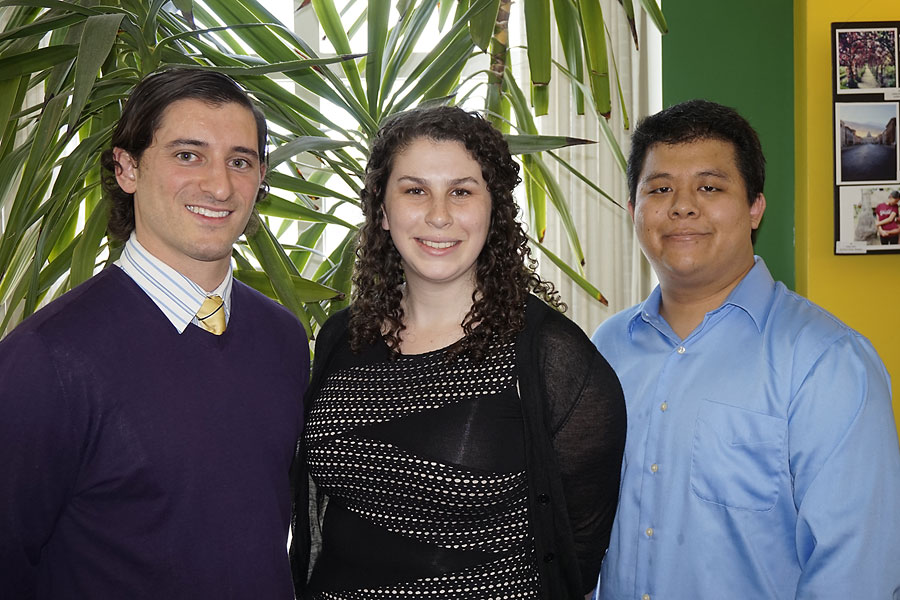
MCS Students Earn Education and Research Awards
By Amy Pavlak
The Mellon College of Science (MCS) presented its awards for education and research during the college’s annual faculty meeting on Thursday, May 7. Winners included David Menasche, Danielle Schlesinger and Eric Wu.
The Guy C. Berry Graduate Research Award, which recognizes excellence in research by MCS graduate students, was presented to David Menasche, a graduate student in the Department of Physics. Menasche’s research focuses on mapping, at the microscopic level, how materials respond to stress. Most materials are made of aggregates of crystals or “grains.” During manufacturing and through normal wear and tear, materials are exposed to a number of stressors, which can cause gaps to form between or within the grains, potentially bringing about material failure. Menasche uses near-field High Energy Diffraction Microscopy (HEDM) to map the internal structure of materials to pinpoint where failure and fracture begin. HEDM, a technique developed by Menasche’s research advisor, Physics Professor Robert Suter, requires an x-ray source that is only available at Argonne National Laboratory’s Advanced Photon Source. Menasche has become an expert at optimizing the x-ray beam optics, the detector, and the data collection software. HEDM experiments generate multi-terabyte data sets that Menasche analyzes using a variety of novel software tools he developed. Menasche collaborates with researchers at Los Alamos National Laboratory, the Air Force Research Laboratory and CMU. “David’s graduate work is helping to push a new x-ray microscopic capability forward,” Suter wrote in a letter nominating Menasche for the award. “His range of roles is impressive and his dedication and hard work are clear.”
Danielle Schlesinger received the Dr. J. Paul Fugassi and Linda E. Monteverde Award, which is presented to a graduating female senior with the greatest academic achievement and professional promise. Schlesinger, who will graduate with a B.S. in Chemistry with university, college and departmental honors, has distinguished herself as an interdisciplinary scholar, talented experimentalist and outstanding leader. She carried out research in Biological Sciences Professor Jon Minden’s lab that focused on visualizing proteome changes associated with the loss of APC, a protein known to be active in 80% of colorectal cancers. She is the co-author of two publications related to her research. Beyond the lab, Schlesinger led the effort to build community within MCS by helping to start the MCS Mentor Program, create MCS Pride Day and revitalize the Dean’s Student Advisory Council (SAC). “There have been many occasions where we would discuss an idea and within minutes of leaving my office she was already making it happen,” said Chemistry Teaching Professor Karen Stump. “CMU will be forever changed through her efforts.” Schlesinger also was an RA, a Community Advisor, a member of the President’s and University SACs, and president of the Jewish Students Association. She plans to attend Princeton University to pursue a Ph.D. in geosciences with a focus on environmental chemistry and toxicology.
Eric Wu, a fourth-year Ph.D. candidate in the Department of Chemistry, received the Hugh D. Young Graduate Teaching Award, which recognizes effective teaching by graduate students. Chemistry Teaching Professor Karen Stump, who nominated Wu for the award, said: “I do not think I have ever seen so many students declare a TA to be ‘perfect’ or ‘the best ever’.” Support for Wu’s nomination poured in—42 students submitted letters on his behalf. The most common terms used to describe Wu were: awesome, fantastic, dedicated, knowledgeable, excellent and caring. His students praised his ability to explain complex concepts and his willingness to help them, even if they are no longer in his class. Wu has been a TA for Modern Chemistry, Modern Chemistry II, Honors Chemistry and Introduction to Modern Chemistry, the largest course that the department teachers. The 250-350 students come to the course with varying degrees of experience and knowledge—a tough task for a TA to tackle. According to Stump, “Eric Wu makes it all look easy, though I know he works extremely hard at it.” His students notice. “I would go so far as to say that Eric is on par if not better than some official professors at CMU,” wrote a former student. “This in no way discredits the great academic faculty here, but instead shows that he is beyond his years, especially when it comes to teaching.”
Originally published: https://www.cmu.edu/mcs/news-events/2015/0508-mcs-edu-res-awards.html